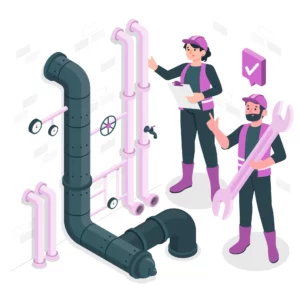Table of Contents
In construction, Mechanical, Electrical, and Plumbing (MEP) systems are imperative backbone components of any building project. Without them, any building wouldn’t function as expected since these systems ensure comfort and safety to the occupants. Along with architectural objects, the cost and quantities related to these systems are very difficult to manage. To solve this, we need MEP Quantity Surveying. MEP Quantity Surveying is a specialized technical field of construction management which intend to financially and contractually handle the workings of MEP systems in construction projects. In this blog, we would discuss and find out what makes the MEP Quantity Surveying important, the main duties of an MEP Quantity Surveyor, the skills required-a must, and much more.
Get hands-on with our MEP course – sign up for a free demo!
Importance of MEP Quantity Surveying
MEP Quantity Surveying is crucial for several reasons:
- Cost Management: MEP systems can account for a significant portion of a project’s budget. An MEP Quantity Surveyor ensures that costs are accurately estimated, controlled, and managed throughout the project lifecycle.
- Risk Mitigation: By providing accurate quantity take-offs and cost estimates, MEP QS helps in identifying potential financial risks early in the project, allowing for proactive risk management.
- Value Engineering: MEP Quantity Surveyors play a key role in value engineering, which involves optimizing the cost-effectiveness of MEP systems without compromising on quality or performance.
- Contractual Compliance: MEP QS ensures that all contractual obligations related to MEP systems are met, including adherence to budgets, timelines, and quality standards.
- Sustainability: With the growing emphasis on sustainable construction, MEP Quantity Surveyors help in selecting energy-efficient systems and materials, contributing to the overall sustainability of the project.
Key Responsibilities of an MEP Quantity Surveyor
An MEP Quantity Surveyor wears many hats throughout the project lifecycle. Here are some of the key responsibilities:
- Cost Estimation: Preparing detailed cost estimates for MEP systems, including materials, labor, and equipment.
- Quantity Take-Offs: Accurately measuring and quantifying materials and components required for MEP systems.
- Tender Documentation: Preparing and reviewing tender documents, including bills of quantities, for MEP packages.
- Contract Administration: Managing contracts related to MEP systems, including variations, claims, and payments.
- Cost Control: Monitoring and controlling costs throughout the project to ensure that the budget is adhered to.
- Value Engineering: Identifying opportunities to reduce costs while maintaining or enhancing the quality and performance of MEP systems.
- Reporting: Providing regular financial reports and updates to stakeholders, including project managers, clients, and contractors.
- Dispute Resolution: Assisting in resolving disputes related to MEP costs, quantities, or contractual obligations.
Master MEP Design with Industry-Leading Training!
Gain in-depth knowledge of Mechanical, Electrical, and Plumbing (MEP) Design with expert-led courses. Learn HVAC, fire safety, sustainable building strategies, and BIM applications to excel in the construction industry.
Know MoreEssential Skills & Tools for MEP QS
To excel in MEP Quantity Surveying, professionals need a combination of technical skills, industry knowledge, and the right tools. Here are some of the essential skills and tools:
Essential Skills:
- Technical Knowledge: A deep understanding of MEP systems, including their design, installation, and operation.
- Numerical Proficiency: Strong mathematical skills for accurate quantity take-offs and cost calculations.
- Analytical Thinking: The ability to analyze complex data and make informed decisions.
- Attention to Detail: Precision is key in quantity surveying to avoid costly errors.
- Communication Skills: Effective communication with stakeholders, including clients, contractors, and project teams.
- Negotiation Skills: The ability to negotiate contracts, variations, and claims to achieve the best outcomes for the project.
- Project Management: Understanding project management principles to manage timelines, budgets, and resources effectively.
Essential Tools:
- Quantity Surveying Software: Tools like CostX, Bluebeam, and PlanSwift are commonly used for quantity take-offs and cost estimation.
- Building Information Modeling (BIM): BIM software like Revit and Navisworks helps in visualizing and coordinating MEP systems, improving accuracy in quantity surveying.
- Spreadsheet Software: Excel remains a powerful tool for cost analysis, budgeting, and reporting.
- Project Management Software: Tools like Primavera and MS Project help in managing project schedules and resources.
- Document Management Systems: Software like Aconex and Procore helps in managing project documentation, including contracts, drawings, and reports.
Get hands-on with our MEP course – sign up for a free demo!
Responsibilities of an MEP Quantity Surveyor
- Conduct feasibility studies and cost analysis for MEP systems.
- Prepare detailed cost plans and cash flow forecasts.
- Review and negotiate MEP-related contracts.
- Track and report on project expenditures.
- Ensure accurate measurement and quantification of MEP works.
- Resolve financial and contractual disputes related to MEP systems.
- Stay updated on industry trends, materials, and technologies related to MEP systems.
Career Opportunities in MEP Quantity Surveying
MEP Quantity Surveyors are in high demand due to the complexity and importance of MEP systems in modern construction projects. Career opportunities include:
- Private Sector:
- Work for construction companies, MEP contractors, or consulting firms.
- Roles include MEP Quantity Surveyor, Cost Manager, or Contracts Manager.
- Public Sector:
- Employment with government agencies or public works departments.
- Roles include project cost controllers or procurement specialists.
- Specialized Consultancies:
- Join firms specializing in MEP cost management and advisory services.
- Freelancing and Self-Employment:
- Work as an independent consultant or start your own quantity surveying practice.
- Career Progression:
- Senior MEP Quantity Surveyor
- MEP Project Manager
- Director of Cost Management
- Partner in a consultancy firm
- Global Opportunities:
- MEP Quantity Surveyors are sought after in international markets, particularly in regions with high construction activity like the Middle East, Asia, and Europe.
Skills and Qualifications
- A degree in Quantity Surveying, Construction Management, or a related field.
- Professional certifications such as RICS (Royal Institution of Chartered Surveyors) or CIOB (Chartered Institute of Building) are advantageous.
- Strong knowledge of MEP systems, construction methods, and materials.
- Proficiency in cost estimation software and tools (e.g., CostX, Bluebeam, or similar).
- Excellent analytical, negotiation, and communication skills.
Conclusion
MEP Quantity Surveying is one of the important and brainy functions in the industry where the MEP systems judiciously must combine economy with operational efficiency. With the increasing complexity of modern buildings, the role of the MEP Quantity Surveyor has never been more essential. By combining technical expertise with strong analytical and communication skills, MEP Quantity Surveyors play a key role in the successful delivery of construction projects.
Be you the construction professional wishing to specialize in MEP QS or a project owner wishing to see the value of MEP Quantity Surveying; this guide provides a touchstone into the vocation and other fields likewise. With the right skills, tools, and know-how, the MEP Quantity Surveyors have the potential to stand out and substantiate their importance toward the overall financial execution and operational success of construction projects.
|
Engineering Upskilling Courses
|
| MEP Course |
| BIM Course |
| Quantity Surveyor Course |
| Structural Design Course |
| MEP QS Course |
Master MEP Design with Industry-Leading Training!
Gain in-depth knowledge of Mechanical, Electrical, and Plumbing (MEP) Design with expert-led courses. Learn HVAC, fire safety, sustainable building strategies, and BIM applications to excel in the construction industry.
Know MoreFrequently Asked Questions
1. What is MEP Quantity Surveying?
Ans: MEP Quantity Surveying is a specialized field within the construction industry that focuses on managing the financial and contractual aspects of Mechanical, Electrical, and Plumbing (MEP) systems in construction projects.
2. Why is MEP Quantity Surveying important?
Ans: MEP Quantity Surveying is important because it helps in cost management, risk mitigation, value engineering, contractual compliance, and sustainability in construction projects.
3. What are the key responsibilities of an MEP Quantity Surveyor?
Ans: The key responsibilities include cost estimation, quantity take-offs, tender documentation, contract administration, cost control, value engineering, reporting, and dispute resolution.
4. What skills are essential for an MEP Quantity Surveyor?
Ans: Essential skills include technical knowledge of MEP systems, numerical proficiency, analytical thinking, attention to detail, communication skills, negotiation skills, and project management.
5. What tools are commonly used in MEP Quantity Surveying?
Ans: Common tools include quantity surveying software (e.g., CostX, Bluebeam), BIM software (e.g., Revit, Navisworks), spreadsheet software (e.g., Excel), project management software (e.g., Primavera, MS Project), and document management systems (e.g., Aconex, Procore).
6. How does MEP Quantity Surveying contribute to sustainability?
Ans: MEP Quantity Surveyors contribute to sustainability by selecting energy-efficient systems and materials, optimizing resource use, and ensuring that MEP systems are designed and installed to minimize environmental impact.
7. Can MEP Quantity Surveying help in reducing project costs?
Ans: Yes, MEP Quantity Surveying helps in reducing project costs through accurate cost estimation, value engineering, and effective cost control throughout the project lifecycle. 8. What is the role of BIM in MEP Quantity Surveying? BIM (Building Information Modeling) plays a crucial role in MEP Quantity Surveying by providing a visual and coordinated model of MEP systems, improving accuracy in quantity take-offs and cost estimation, and facilitating better collaboration among project stakeholders.












